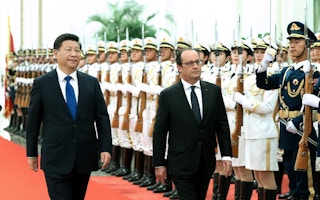It seems almost certain that US President-elect Donald Trump will walk away from the Paris climate agreement next year. In the absence of US leadership, the question is: who will step up?
Sadly this is not a new question, and history offers some important lessons. In 2001 the world faced a similar dilemma. After former vice-president Al Gore lost the 2000 election to George W. Bush, the newly inaugurated president walked away from the Kyoto Protocol, the previous global pact to reduce greenhouse gas emissions.
That sent shockwaves around the world, and left nations facing a choice about what to do in the United States’ absence – something they may face again next year. The choice was made more difficult because the US withdrawal made it less likely that the Kyoto Protocol would ever come into force as a legally binding agreement.
However, Europe quickly picked up the baton. Faced with a US president who had abdicated all responsibility to lead or even participate in the global emissions-reduction effort, the European Union led a remarkable diplomatic bid to save Kyoto.
To the surprise of many people, especially in the United States, this diplomatic push brought enough countries on board to save the Kyoto Protocol, which came into force in 2005 following Russia’s ratification.
What will happen this time?
While the withdrawal of the United States slowed international efforts back then, as it doubtless will now, this time around the world is in a better position to respond.
First, the Paris agreement has already come into force and global ambition is arguably stronger today than it was in 2001. Whereas the Kyoto Protocol took almost a decade to come into force, the Paris Agreement has taken less than a year.
And importantly, whereas countries with emerging economies shied away from any commitment to limit their greenhouse gas emissions under the Kyoto Protocol, this is not so today. Under the Paris deal, both developed and developing countries have pledged to rein in their emissions.
Second, should Europe decide to take on a leadership role as it did in 2001, the rise of China offers a new and potentially powerful partner. China is now the world’s number-one energy consumer and greenhouse emitter. But it has also been one of the most active proponents of climate action.
Under the Paris agreement China has already agreed to cap its emissions and is actively taking steps to reduce its reliance on fossil fuels, especially coal. Recent data indicate that China’s coal consumption peaked in 2014 and is now set to decline.
“
The climate isn’t waiting to see what a President Trump does, and neither should the world.
Filling the void
If Europe and China together decide to fill the vacuum left by the United States, they could form a powerful bloc to lead global efforts against climate change. Leaders in Europe have already hinted at retaliation should the United States withdraw from the Paris Agreement, with former French presidential candidate Nicolas Sarkozy suggesting a carbon tax on US imports. Should China follow the same path, together they would represent the largest import market in the world, giving them a very large stick to wave at America.
An EU-China bloc could also help to ensure that there is less potential for other nations, including Australia, to follow the United States down the do-nothing path.
That said, while the world’s politicians may be in a better position than in 2001 to deal with the fallout from another recalcitrant American administration, the world’s climate is not. The growth in fossil fuel emissions has been slowed but not yet reversed, and global temperatures continue to climb. The effects are evident around the world, not least in this year’s devastating bleaching of the Great Barrier Reef.
We should expect that President-elect Trump will withdraw from the Paris Agreement. Even if he changes his mind (which he has done on plenty of other issues), there are many in the Republican Party who will hold him to his word.
The climate isn’t waiting to see what a President Trump does, and neither should the world. Should China and Europe decide to lead, many nations will follow, and one day soon so too will the United States.
![]()
Christian Downie is Vice Chancellor’s Postdoctoral Research Fellow, UNSW Australia. This article was originally published on The Conversation.









